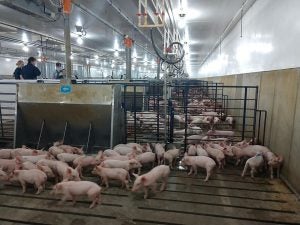This past year has received a lot of attention regarding anti-animal agriculture movements. While most usually stay within the eye of the agricultural world and animal-rights activists, some have caught the attention of the mainstream. Most movements typically turn into a debacle, as they receive harsh backlash from the agriculture community but are conversely supported by many consumers. Notably, one of the most prominent initiatives of this movement, Proposition 12, passed by California voters, managed to become a legal precedent.
Although passed in 2018, Prop 12 has been making headlines outside of your typical agricultural outlets. Formally titled the Prevention of Cruelty to Farm Animals Act, 62.7 percent of voters favored the legislation, which raises space requirements in California for animal production and bans pork sold within or to California by producers that do not meet those requirements. The new law will go into effect on Jan. 1, 2022, despite multiple challenges by the National Pork Producers Council and American Farm Bureau Federation.
» Related: Perspective: The anti-meat movement is mainstream, and that should be concerning
You can pick through many articles to find out more about California’s new proposition, but my actual bone to pick is with the Los Angeles Times Editorial Board. Recently, the board published an opinion article that said the blame should be on pork producers for any rise in meat prices for consumers, not on the arbitrary law.
In an article that the LA Times published last week, they cited that California only produces 17 percent of the pork it consumes, making the large state a major importer of pork. California also accounts for 15 percent of U.S. pork consumption, outsourcing its pork products primarily from my home state of Iowa, which the Times also points out.
Not only does the editorial board blame California producers who refuse to comply with the new regulations, they also point fingers at other states who would wish to sell meat products to the state without complying with the new law as well. The Times editorial applauds the billion-dollar food company, Hormel, which can easily afford to comply with the new regulations, but is willing to leave smaller producers in the dust.
When it comes to the humane treatment of animals, the board writes, “California has been on the forefront of protecting animals who live short, dismal lives on factory farms either to produce food for us (egg-laying hens) or to be slaughtered and sold as food.”

While that may be true for Californians, the definition of humane treatment of animals has ever-changing standards. According to California’s Department of Food and Agriculture, “Many advocates view self-guided behavior of the animal industry and current federal and state laws governing the treatment of animals as insufficient to ensure their welfare, and these advocates have embarked upon campaigns to enact more stringent laws.”
No matter what, animal-rights activists will never be satisfied as long as animal agriculture still exists. In fact, PETA did not support the passage of Prop 12 because eggs can still be sold under the new law if they are cage-free. The group said that the proposition was a “step backwards” because it does not achieve close to what it has tumultuously fought to accomplish.
As a response to the editorial, a Los Angeles resident opined, “Before you order bacon or other pork products, consider that pigs are as smart or smarter than your 3-year-old child or your pet dog. Forget about the price. Maybe you should eat something else.”
Another voter slammed the LA Times, while lobbying that pigs should not be used for meat consumption at all.
“Your editorial is disturbing,” the person wrote, “You say, ‘Even animals that end up as food deserve(s) to be treated without cruelty before they are killed.’ This kind of thinking is the essence of everything that is insufficient, and just plain wrong, about ‘animal welfare.’ Animals don’t just deserve to be treated better before they are killed; they deserve not to be killed at all.
“We are talking about sentient beings — intelligent and with feelings, like your dog or cat — who do not want to die,” the letter continued. “They should not be slaughtered for the sake of your taste buds.”
That shows that some Californians did not vote to improve the living conditions of sows but to end pork production altogether.

California voters can do what they want to govern their state. Still, California’s Proposition 12 is a cheap shot to animal agriculture as its large reliance on out-of-state pork forces other states to change their practices to trade. The new law surpasses state sovereignty to impose a year-federal regulation.
Even as the Times’ editorial board supports the passage of Prop 12, they are not on the side of producers that do comply, which is displayed in the last paragraph of the article.
“For fans of bacon and other pork,” they write, “any rise in cost is the price of not having a pig suffer before it’s killed for food. It’s a price the animals shouldn’t have to pay.”
Behind their (not-so) convincing argument, the writers still use activist talking points that display no sympathy for the agricultural industry.
Dawson Schmitt is a student at Iowa State University studying Agricultural Communications. He operates a blog called The Heartland Report.


